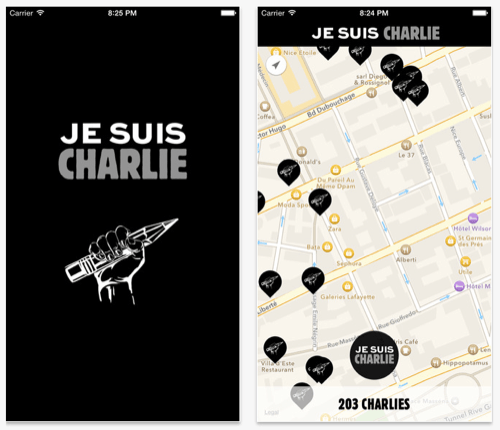
In what is likely the fastest App Store approval in iOS history, Apple took only one hour to greenlight an app that promotes a free speech campaign for Charlie Hebdo. Of course, Apple would never have approved an actual Charlie Hebdo app had the caustic—even scabrous—French magazine ever submitted one. (Which it apparently considered back in 2010 before learning of Apple’s restrictions and telling the company to “get lost.”) Like much of Silicon Valley, Apple is far more committed to the idea of free speech than it is to its actual practice.
The “Je suis Charlie!” app supports the Je Suis Charlie free speech campaign and Charlie Hebdo, which lost 10 staffers in a terrorist attack at its Paris office last week. The order to expedite review of “Je suis Charlie!” came courtesy of Apple CEO Tim Cook, 9 to 5 Mac reports. Cook’s assistant responded to an email from Nice-Matin, the French news agency that submitted the app, 10 minutes after it was sent.
Free Speech For Me But Not For Thee
No one should begrudge “Je suis Charlie!” its fast-tracking, even though typical app review takes 10 days or longer. Prospective iOS apps connected to tragedy and the support of free speech are rare events, fortunately.
Pulitzer Prize-winning political cartoonist Mark Fiore, for instance—whose own app was famously rejected by Apple in 2009—has no problem with the speedy approval of “Je suis Charlie!” He does, however, see some tension in the fact that Apple fast-tracked an app intended to express support of cartoonists whose work would never have cleared App Store guidelines.
“I’m glad they approved this app so quickly,” Fiore told ReadWrite. “What makes my skin crawl is that most of the stuff Charlie Hebdo does, Apple wouldn’t approve.”
Fiore, whose work is comparatively tame to the majority of Charlie Hebdo’s catalog, ran up against Apple’s licensing agreement in 2009. At that time, Apple guidelines stated it would reject apps apps which “may be found objectionable, for example, materials that may be considered obscene, pornographic or defamatory.”
According to his Apple rejection letter, the offending content on Fiore’s app included political cartoons that referenced torture and White House party crashers. It wasn’t until Fiore became the first online-only political cartoonist to win the Pulitzer in 2010 that the Apple App Store had a change of heart. In the ultimate Apple mea culpa, then-CEO Steve Jobs reportedly responded to one of the many customer complaint about Fiore’s App Store rejection. “This was a mistake that’s being fixed,” Jobs wrote from his own email account.
In the wake of his Pulitzer win, Fiore said, “I received this Deep Throat-sort of phone call from Apple.” The voice the other side of the phone told him, “you might want to reconsider resubmitting this app and give us a call when you do.” Which he did.
Speed When It Counts (For Apple)
The speediness with which Fiore’s second submission hit the App Store illustrates how quickly a giant company can make things happen once publicity is involved. Fiore made the call to let Apple know. Within two keystrokes Fiore overheard on the phone, his app hit the App Store. “It was pretty much an instantaneous thing,” he said.
The bad PR led to an update of Apple’s rules, which now allow for political content and lampooning public figures, but still reflect some subjective sensitivity concerning satire. Time reported in 2013 that Apple yanked the iOS game Sweatshop from the App Store. The developer describes as “lighthearted” but also “based upon very present realities that many workers around the world contend with each day.”
“It’s the idea that a game intended both as educational and intelligently satirical could wind up banned that’s dangerous,” Time’s Matt Peckham wrote.
Apple isn’t the only Silicon Valley behemoth to embrace Charlie Hebdo in the abstract. Twitter’s French unit displayed a #JeSuisCharlie banner on its Twitter profile, while Facebook CEO Mark Zuckerberg wrote in a tribute post that “different voices—even if they’re sometimes offensive—can make the world a better and more interesting place.” Both social networks, of course, have a documented history of censorship. It’s the price of building a business in countries where free speech is not a priority.
Google, too, is getting headlines for contributing $300,000 toward 1 million copies of Tuesday’s Charlie Hebdo edition. But that cash isn’t coming from the goodness of Google’s heart, or even its couch cushions. It’s part of a $70 million fund Google agreed to set up for French publishers two years ago as part of a settlement with the government over advertising loss. “It’s good that (Charlie Hebdo) got the money, but it’s good PR for Google, too,” Fiore says.
As for Apple, Fiore says, “They show their support, ‘We’re all for free speech!’ But would you run these cartoons? Uh, no.”
Just heard Apple fast-tracked a #JeSuisCharlie app. Now let's see if they fast track a @Charlie_Hebdo_ app.
— Mark Fiore (@MarkFiore) January 12, 2015
Apple did not return ReadWrite’s request for comment.

















